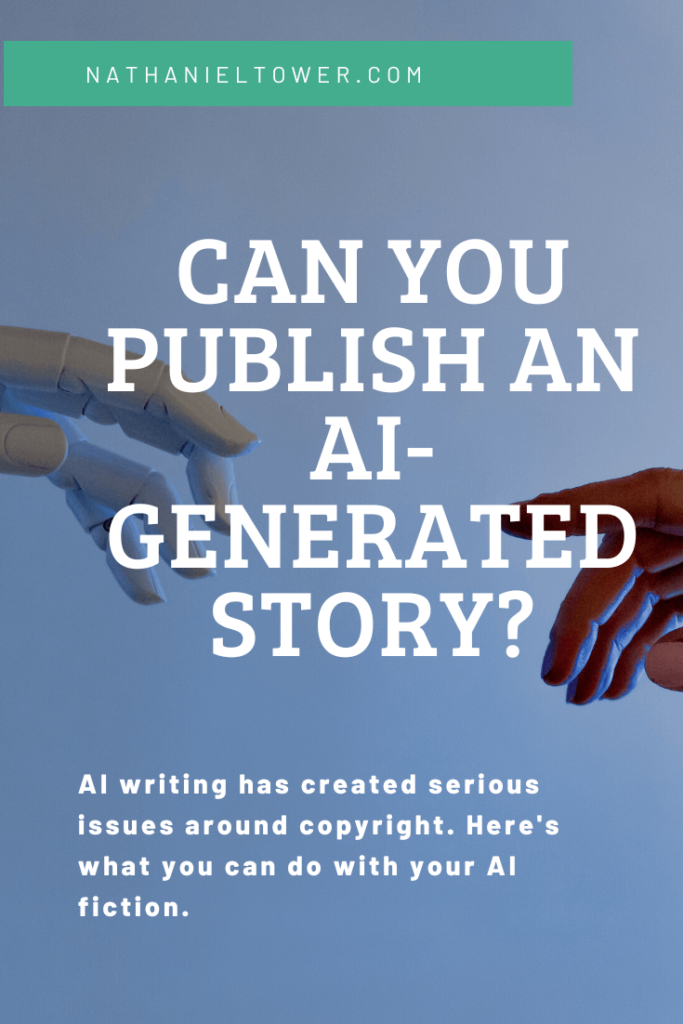Last Updated on August 16, 2023 by Nathaniel Tower
Note: No part of this post was written by, edited, or reviewed by any AI writing tools.
With the rise of artificial intelligence writing tools, many people have started letting AI do all the work for them. Unfortunately, this includes short story writers and novelists who are trying to make a quick buck without doing the writing themselves.
Some people have gone as far to spend thousands of hours generating short books and self-publishing them on Amazon (the return on investment definitely isn’t there if you look at the numbers).
More reasonable writers allow AI tools to assist in the writing process by asking these tools to come up with ideas, create outlines, check grammar, or perform research.
However you are choosing to use AI in your writing process, it’s important to understand the ramifications of these decisions.
So let’s consider this: can you get your AI-generated story published?
The answer is a bit complicated, but it ultimately depends on a few things:
- How much of the story is actually generated by AI versus written by you?
- What are the guidelines of the publication you are submitting to?
Even the answers to these questions don’t lead to clear rules about whether your AI-generated stories are eligible to sell for publication. There is no magic percentage that makes an AI story yours versus the intellectual property of the program that generated it (which isn’t exactly accurate either, but let’s go with that for now).
To be clear, I don’t support the use of AI writing tools to write short stories or other complete works for you, but if you do choose to go down that path, then here’s what you need to do.
Check the guidelines for AI restrictions
Many reputable publications have been quick to update their submission guidelines to clearly state that AI-generated fiction is not allowed. Tools like Duotrope and Submission Grinder have incorporated this new restriction into their databases so you can easily search for publications that do or don’t allow AI-generated work.
If a publication states that AI work isn’t allowed, then don’t submit any work that was generated by AI. These publications want work that is 100% written by humans. And they have a good reason for wanting this. Most publications exist to share the brilliant work of the human mind, not to promote what machines can create.
If your story is generated by artificial intelligence in any way, you should not submit it to any publication that forbids AI stories. That doesn’t mean you can’t use AI to help you with the editing process, but just make sure the writing itself is yours.
So what if the publication doesn’t explicitly restrict you from submitting content written by AI?
This is where things get a bit tricky.
Do you own the copyright?
Not every publication has an official stance on AI content, but almost every publication has some requirements around copyright.
In simple terms, most publications require you to own the copyright before they will publish the work you submit.
I have some bad news for all those AI writers out there: you don’t own the copyright to the work you asked AI to generate for you.
And that creates a big problem for publishers.
In May of 2023, the U.S. Copyright Office made it clear that you can’t copyright any writing, images, music, or other creative works that are generated in part or full by artificial intelligence.
The reasoning for this is pretty simple: not only did you not create the work yourself, but the work is the collective result of thousands of other works that have been processed by the artificial intelligence program. It’s not only not yours, it isn’t just any single entity’s work.
Since you don’t own the copyright, you really shouldn’t submit any AI-generated fiction to any publication at all unless they specifically say that AI work is acceptable.
So what should you do with your AI stories?
My vote is to do nothing with them. Actually, let me rewind. My vote is not to create them in the first place.
As mentioned earlier, use AI to help with outlines, short story ideas, fact checking, and grammar review. Please don’t have AI tools write stories for you. At best, you’ll create a mediocre story that you don’t technically own. At worst, you will damage the publishing industry and the integrity of writing as a whole.
If you do create a story through AI tools, please don’t try to publish it as your own. Share it on social media for laughs. Post it on your blog with a clear disclaimer about how it was created by AI. Submit it to a publication that exclusively prints AI-generated stories. But don’t pretend it is your work, and don’t tell anyone you wrote it no matter how much prompt engineering it took to get it just right.
Have you used AI tools to write any short stories or novels? What did you do with that work? Share your thoughts and experiences in the comments.


It is now a standard line in my submission letters that no part of my story was generated through the use of AI. (I don’t even like Word’s grammar checker AI.)